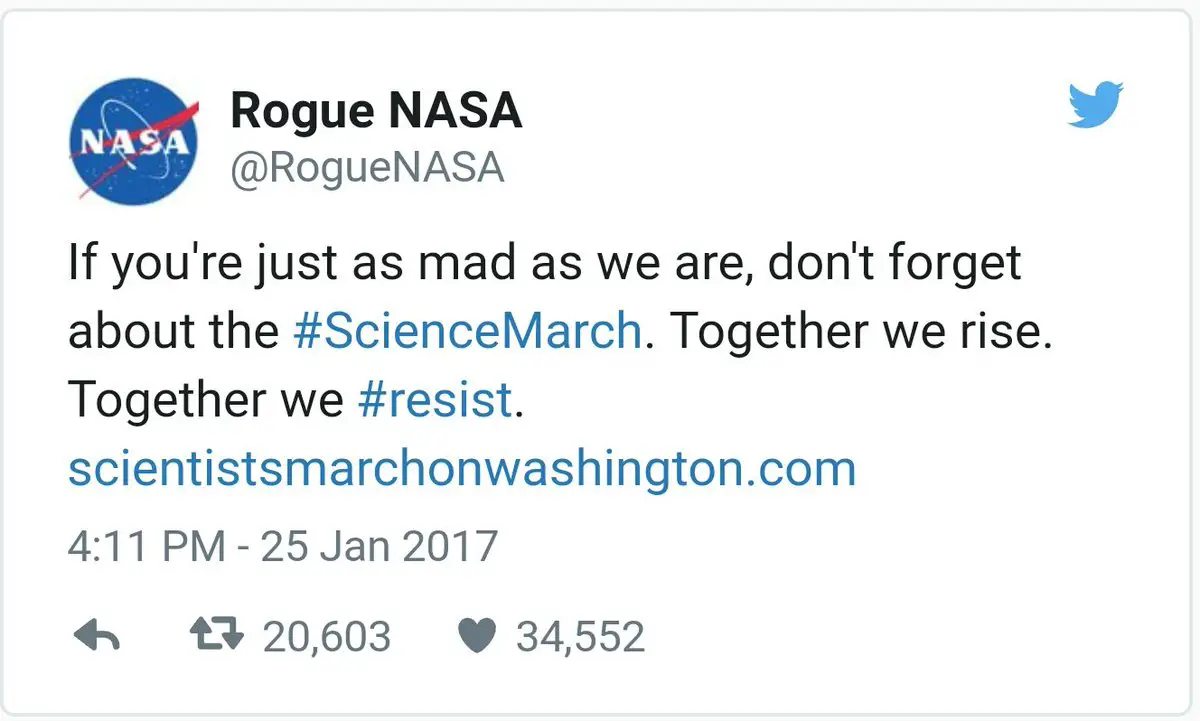The Birth of Alt Twitter
Facing regulatory muzzles from the Trump administration, key agencies and scientists are finding creative, sometimes illegal ways of speaking up.
By Ashley Wertz, University of Pittsburgh
It all began on Inauguration Day 2017.
A retweet from the National Park Service (NPS), comparing a photo of the thin crowd for Trump’s inauguration with Obama’s denser 2009 crowd, was immediately deemed an unfair attack from the wicked media and their objective facts.
NPS hadn’t even provided commentary on the tweet, but that didn’t stop the Trump administration from placing a social media gag on the Environmental Protection Agency and the U.S. Department of Agriculture. However, the Inauguration photos are just the tip of the iceberg.

I can’t claim to be an expert on politics or how social media works within the political sphere, but it’s interesting to see how much of an impact it’s had in recent presidential terms. In the days before information could be transmitted to millions of people in a matter of seconds, it was harder to research claims.
But, now that news is easier to spread than ever, one has to wade through a lot of “alternative facts” to find any truth. Even elected officials people are expected to trust are flubbing their sworn duties from the get-go. Sean Spicer, White House Press Secretary, lied the literal day of the inauguration. And they say first impressions are everything.
Luckily, there are people out there who have the guts to say “no” when something is off or straight up unconstitutional. And halting important information and research from government organizations, such as NASA, the Food and Drug Administration, U.S. National Weather Service and national parks from Hawaii to Washington, is indeed a fishy move. Paired with the fact that the White House website no longer has a page for climate change, the concern is warranted. So, how have these organizations been pushing back?
Alt Twitter
To protest the social media restrictions, members and advocates of various government organizations have been creating “rogue” Twitter accounts, which provide uncensored research and news about the factors affecting the environment and global climate change, among other subjects. The owners of the accounts remain anonymous, but it’s not as if they’re claiming anything radical.
Really, the point of these accounts is to keep people informed on already existing knowledge that’s gone largely unnoticed, like every time somebody takes loads of money and uses it to benefit harmful industries instead of conserving what needs protecting. You know, the information that apparently isn’t as important as whatever shows up on E! News.
Another goal of the rogue Twitter accounts is to promote involvement in the political process. Too many people believe that their voices don’t matter or claim that “whatever happens, happens.” The problem with the political system is the lack of representation by actual people who care what happens to the world, and the long-term effects of letting the people who don’t care run the show.
The government organizations running rogue accounts are full of people who know what the heck they’re talking about. Professional scientists, engineers, researchers and more are knowledgeable in their fields, so why would anyone trust the ill-informed opinion of officials who have no understanding of forestry, fossil fuels, emissions, global temperature changes, conservation, sustainability and so much more?

The fact that these organizations have to jump through some weird hoops to even do their job is disconcerting. So worrisome, in fact, that scientists who have refrained from political involvement in the past are now stepping to the forefront by expressing interest in running for government positions.
Childhood heroes like Bill Nye are creating even more content to inform and dispel myths upheld by powerful influencers, such as politicians and religious leaders. Neil deGrasse Tyson has urged to “Make America Smart Again,” due to the inadequate education in many subjects, not just STEM. Nye and Tyson have always been outspoken when it comes to such issues, but now they have the power of freshly rebellious organizations to back them up further.
Stay Informed, but Stay Positive
It’s natural to be leery of things you see online. Do your own research, form your own opinions and fact-check the hell out of anything that seems out of the ordinary (though, these are rather unordinary times).
Unfortunately, there are people out there who want you to stay in the dark. A population that doesn’t know what’s going on is less likely to make an effort to fight for change, or question the information they’re given by actual appointed government officials. And when officials are hardly qualified to share the information they’ve been hired to understand, there should be thorough reconsideration, or some intense head scratching at the least.
With the emergence of rogue social media accounts, sifting through information may seem more daunting of a task than ever. But just think about the countless political memes you see on Facebook, and then consider how many people bother to make a simple Google search to ensure they’re not spreading a completely fictional scenario.
It’s far too easy for somebody to make falsehoods go viral, and once those things get going, they’re hard to stop.
Usually a search takes you somewhere as simple as Snopes.com, but sometimes it can get deeper. That’s when you know something more needs to be done.
But spreading knowledge and boosting awareness doesn’t have to be negative all the time. In fact, helping to spread positive information is another way alternative Twitter accounts are using social media’s wide-reaching influence. This past week, the hashtag “ActualLivingScientist” was trending in response to a lack of public knowledge concerning scientists who aren’t famous and dead.
Many people, especially women, in the science field used the hashtag while posting pictures of themselves at work to show just how many professions lie in the “science” category. Involvement like this leads to solidarity, not just within the scientific community itself, but everyone who finds themselves concerned with the way America is being treated right now. If nothing else, these unverified accounts provide proof that you’re not the only one trying to make a difference.









